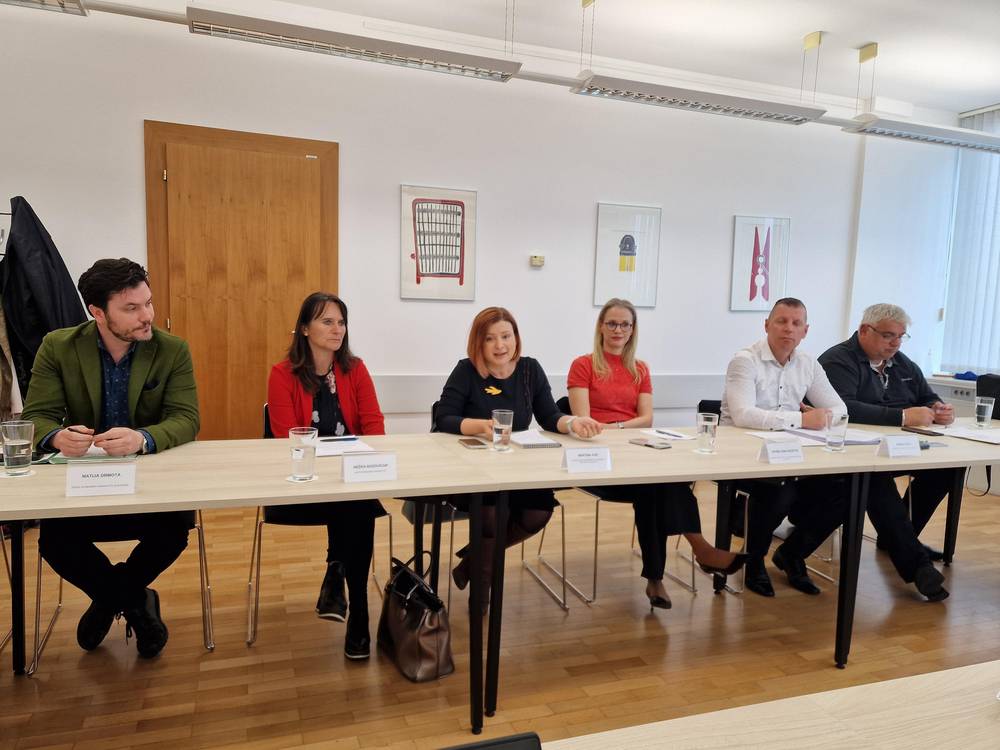Human Rights Ombudsman Peter Svetina invited trade union representatives to a meeting on 24 April 2024, in honour of International Labour Day, which is celebrated on 1 May every year in most countries of the world. They discussed the realisation of the rights of the employed and the unemployed, and paid attention to the importance of social dialogue, talked about the issue of occupational diseases, the effectiveness of inspectorates, and touched on pension and tax reform.
In the introduction, the Ombudsman emphasised that the state must be an example in protecting the rights of workers and is obliged to regulate social relations and prevent inequality, which the interlocutors agreed with. He expressed hope that the European Parliament will adopt a European directive on due diligence in companies regarding sustainability. "It happens too often in business practices that issues of respect for human rights and environmental protection are ignored. It is also necessary for the entire public sector to accept a commitment to respect human rights and the environment in its operations," emphasised the Ombudsman.
For many years, the Ombudsman has pointed out the importance of a tripartite dialogue between workers, the state, and employers, which is the basis for negotiating workers' rights and other democratic gains at the level of the European Union as well. He follows the promises regarding the revival of the social dialogue with a degree of caution, because, in his opinion, the actors of the dialogue face the hard work of re-establishing trust in the process of negotiating workers' rights. The Ombudsman emphasises that social dialogue is necessary for the healthy and balanced development of society and for balancing the economic goals of competitiveness with the social goals of social cohesion. "However, it is also necessary in order to avoid multitudes of ill-conceived laws that need to be reopened and changed with well-considered and determined solutions," the interlocutors agreed. They expect the creation of a system in which cooperation would be binding and processes would be managed in a timely manner and with all elements of social dialogue.
This year's interlocutors also stressed that work must be appropriately valued and that payment below the minimum wage, which in no way enables a decent life, is not acceptable in a social and rich country like Slovenia. Too low incomes are later reflected in low pensions, which can lead to poverty or a number of other rights violations, they agreed.
The Ombudsman emphasised that the right to work is one of the most important human rights, and the right to decent work must be guaranteed to everyone without discrimination. In addition to fair pay, this right also includes the right to work in decent working conditions, in a healthy and safe working environment, the interlocutors agreed. Unions are seeing an increase in employee health problems due to overwork. They find it increasingly difficult to balance their private and work lives, and they also encounter the encouragement of presenteeism by some employers.
They pointed out that job rehabilitation is inadequate, and the question of the quality of decision-making by commissions on disability status is still open. Even the issue of occupational diseases, which the Ombudsman has been warning the state about for many years, has not yet received an epilogue. The consequences of inadequate care for employees are reflected in higher costs from the health fund, which all taxpayers pay, the interlocutors concurred.
The Ombudsman and trade union representatives also paid attention to the inspection control of labour relations. They agreed that the controls should be strengthened, and above all implemented in a targeted and consistent manner, with an epilogue that would send a message to violators that violating workers' rights is not worthwhile.
The meeting participants estimated that the lowering of the standards of workers' rights is acute and that the same demands are on the agenda today as 138 years ago, when workers in Chicago demanded decent pay and normal working hours. They also agreed that the pursuit of rights is never a finished process.
The meetings with the Ombudsman and his deputy Dr. Dijana Možina Zupanc were attended by Matija Drmota, Federation of Free Trade Unions of Slovenia, Nežka Bozovičar, Council of Gorenje Trade Unions, Martina Vuk and Staša Curk Acceto from the Confederation of Public Sector Trade Unions, Damjan Volf, Confederation of Trade Unions 90, and Albert Pavlič, President of the Confederation of Labour Unions of Slovenia – Solidarity.
Ombudsman Peter Svetina congratulates all workers on the upcoming Labour Day.

![[Translate to English:] Predstavniki sindikatov pri varuhu](/fileadmin/_processed_/f/c/csm_Varuh_s_sindikati_d839accfd0.jpg)
![[Translate to English:] Varuh, namestnica in sindikati za mizo](/fileadmin/_processed_/1/0/csm_Varuh_s_sindikati_2_5b71029056.jpg)